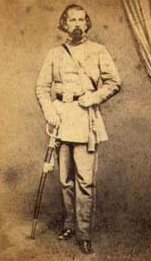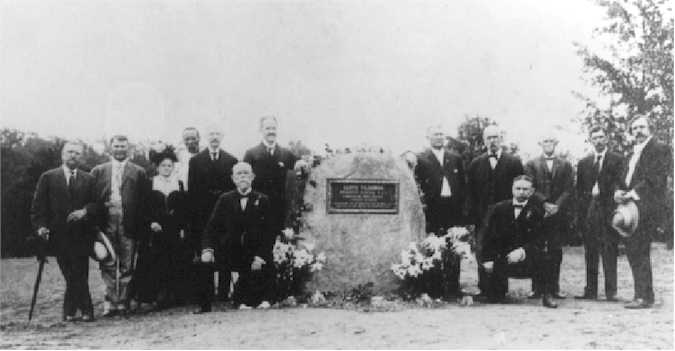Tribute To General Lloyd
Tilghman
from
Confederate Veteran, July, 1910
with comments by
L. S. Flatau
Cowan's Battery, First Mississippi
Light Artillery
from
Confederate Veteran, September, 1910
Extract from report of his division
commander, Gen. W. W. Loring: "As soon as the enemy discovered
that we were leaving the field he rallied and moved forward in heavy
force. General Tilghman had been instructed to hold a point on the Edwards
Depot and Raymond road at all hazards. Always ready to obey orders, he
soon met the enemy, 6,000 to 8,000 strong, with a fine artillery; him,
being advantageously posted, he not only held him in check but repulsed
him on several occasions, and thus kept open the only line of retreat left
to the army. The bold stand of this brigade, less than 1,500 effective
men, under the lamented hero, saved a large portion of the army. It is
befitting that I should speak of that death of gallant and accomplished
Lloyd Tilghman. Quick and bold in the execution of his plans, he fell in
the midst of his brigade that loved him well, after repelling a powerful
enemy in deadly fight, struck by a cannon shot: A brigade wept over the
dying hero, alike beautiful as it was touching." Extracts from the report of Col. A. F.
Reynolds, who succeeded Tilghman: "At 5:20 o'clock Brig. Gen.
Lloyd Tilghman who up to that time had commanded the brigade with marked
ability, fell, killed by a shot from one of the enemy's guns. I cannot
here refrain from paying a slight tribute to the memory of my late
commander. As a man, a soldier, and a general, he had few if any
superiors. Always at his post he devoted himself day and night to the
interests of his command. Upon the battlefield he was cool and collected
and observant. He commanded the entire respect and confidence of every
officer and soldier under him, and the only censure ever cast upon him was
that he always exposed himself too recklessly. At the time he was struck
down he was standing in the rear of a battery directing a charge in the
elevation of one of the guns. The tears shed by his men on the occasion
and the grief felt by his entire brigade are the proudest tribute that can
be given the gallant dead." General Tilghman was one of the most
picturesque figures of the Confederate army. He was very handsome and a
strict disciplinarian. Untrained soldiers winced at his discipline, but
they realized under him that war was not a frolic. One particular day has
often been recalled when the army at Vicksburg was reviewed by General
Pemberton. At the inspection of General Tilghman's brigade his men were so
thoroughly at duty that General Pemberton stopped at intervals to comment
in complimentary terms. One instance is reported from the Veteran for
February 1910: "General Pemberton was escorted by Gen. Lloyd
Tilghman. When riding briskly along the line, General Pemberton reigned
his horse suddenly and stopped in front of the 41st Tennessee. He pointed
to Fohrer and asked: "What soldier is that?" He was informed as
to the man, whose position in line was that of a faultless soldier. His
gun looked like burnished silver - doubtless the only one like it in the
army. General Pemberton then looked along the line and said: "I'll
sw'ar, that is a fine-looking body of men.' Fohrer was tidy and neat of
dress, but he would sleep with his boots on. In complains concerning poor
fare, etc., he emphasized his displeasure with 'Be dam;' but it was not
like English spoken profanity and did not seem wicked as he would say
it." When General Tilghman offered his life in
defense of the cause of the South as he heroically resisted the advance of
Grant's victorious legions, he wrought with his own blood on the sluggish
banks of Baker's Creek an epitaph which will not be forgotten as long as
the bronze statue lasts to remind all who see it of his intrepid courage
and gallantry. Comrade W. G. Whitefield, who was first
sergeant of Company D, 35th Alabama Regiment, Buford's Brigade, Loring's
Division, and is now Adjutant of Camp 463, UCV at Paducah, Ky., writes: "I
was on the run passing out just behind General Tilghman when he was
killed. In November, 1908, I went to Champion Hill and located the
place." The gallant commander and his brave men
must be honored while patriotism has an advocate and self-sacrifice for
others has a votary. Higher commendation from a higher source no citizen
or soldier ever received. L. S. Flatau I have read that most interesting article
in the Veteran in regard to General Tilghman. General Tilghman was a most
daring, dashing, splendid officer, and we were often fearful that he would
be killed. I belonged to Cowan's Battery of Vicksburg, Miss., referred to
in the sketch. I was the gunner directing and sighting the gun at the time
by the advice of General Tilghman, who had perfect knowledge of the
situation of the enemy through his field glasses. His last words to any
one were in the highest compliment to me, praising my excellent
marksmanship, except the words he spoke as he fell from his horse after a
three-inch rifle shot had cut him nearly in two, and as he careened and
fell he said to his son, who caught him, "Tell your mother; God
bless her." [At General Tilghman’s side when he was shot was his
nephew, Oswald Tilghman, who was also Tilghman’s Aide-de-Camp. If Tilghman actually said,
‘Tell your mother, God bless her,’ then the final words would have been meant for
Oswald’s mother and not his own.] He was at that time near my guns, but had
turned to ride down the line and was fully exposed to the fire of the
enemy from small arms as well as a splendid battery that we had been
dueling with for at least half an hour, and under his directions, we had
silenced it. Any one that was there will surely recollect that the entire
line was driven back almost in our rear, and we held every inch of the
ground until sundown, and this we did because of the wonderful
encouragement and splendid management of this gallant chieftain who gave
his life for our Southland. The stone that has been placed at the spot
where he fell marks not only the ground stained with his blood but also
marks the spot where Cowan's Vicksburg Battery did such fine execution
under his direction. After his death that line was so neglected that the
enemy had almost cut our retreat off from Vicksburg. We were huddled that
night in the creek bottom and were forced to abandon our guns. Part of
Loring's Division went into Vicksburg and part of it went out with General
Loring. Our battery was divided, part of it following First Lt. George
Tompkins, the other part following Captain Cowan into Vicksburg. We were
all in darkness and disorder, and hardly knew what we were doing or who we
were following until late the next day. Had this splendid officer lived, Loring's
Division would have gone into Vicksburg in good order with the balance of
the army that met the Yankees at Baker's Creek. His death at that time
surely was a great shock to all of us, and no men ever felt the loss of a
commander more than we did then.
General Tilghman was born in Maryland in 1817.
He was a graduate of West Point in 1836, a soldier in the Mexican War, a
civil engineer upon the Panama Railroad in 1849 and subsequently upon the
Baltimore and Ohio, Cumberland Valley, Pennsylvania Central, East
Tennessee and Virginia, and new Orleans and Ohio Railroads, and commander
of the Kentucky State Guard in 1861, most of whom he took into the
Confederate service. He was colonel of the 3d Kentucky Regiment and
promoted to brigadier general. After a vigorous defense he surrendered
Fort Henry February 6, 1862, to Admiral Foote and was sent a prisoner of
at Fort Warren, in Boston Harbor. On being exchanged he was placed in
charge of exchanged prisoners at Jackson, where he reorganized and
equipped them for the field. He led them against Grant's forces at
Coffeyville, and signally defeated them on December 5, 1862. He served in
the Vicksburg campaign to May 16, 1863, at Champion Hill, where he lost
his life.

Brigadier General Lloyd Tilghman
1816-1863
Cowan's Battery, First
Mississippi Light Artillery
from
Confederate Veteran, September, 1910
 Photograph taken at the dedication of the Lloyd Tilghman Monument on May 18, 1909. Pictured left to right: the two men on the far left are thought to be Sid Thomas and W. M. Robb from Edwards; florist (woman), from Vicksburg; Ike Caston (colored man standing behind the florist), property owner; Tilghman brothers lawyer and banker from New York standing behind Tilghman who is kneeling to the left of the stone; Oswald Tilghman, nephew of the general, standing to the right of the stone; William Rigby, superintendent of the Vicksburg National Military Park; the other Tilghman brother kneeling; Captain William T. Ratliff, third from right; J. W. Ratliff, second from right; and Henry Howard Kitson, famous sculptor from Boston, on the end.
Photograph taken at the dedication of the Lloyd Tilghman Monument on May 18, 1909. Pictured left to right: the two men on the far left are thought to be Sid Thomas and W. M. Robb from Edwards; florist (woman), from Vicksburg; Ike Caston (colored man standing behind the florist), property owner; Tilghman brothers lawyer and banker from New York standing behind Tilghman who is kneeling to the left of the stone; Oswald Tilghman, nephew of the general, standing to the right of the stone; William Rigby, superintendent of the Vicksburg National Military Park; the other Tilghman brother kneeling; Captain William T. Ratliff, third from right; J. W. Ratliff, second from right; and Henry Howard Kitson, famous sculptor from Boston, on the end.
Mississippi Department of Archives and History
| Home | Grant's March | Pemberton's March | Battle of Champion Hill | Order of Battle | Diaries & Accounts | Official Records |
| History | Re-enactments | Book Store | Battlefield Tour | Visitors |
Copyright (c) James and Rebecca Drake, 1998 - 2002. All Rights Reserved.